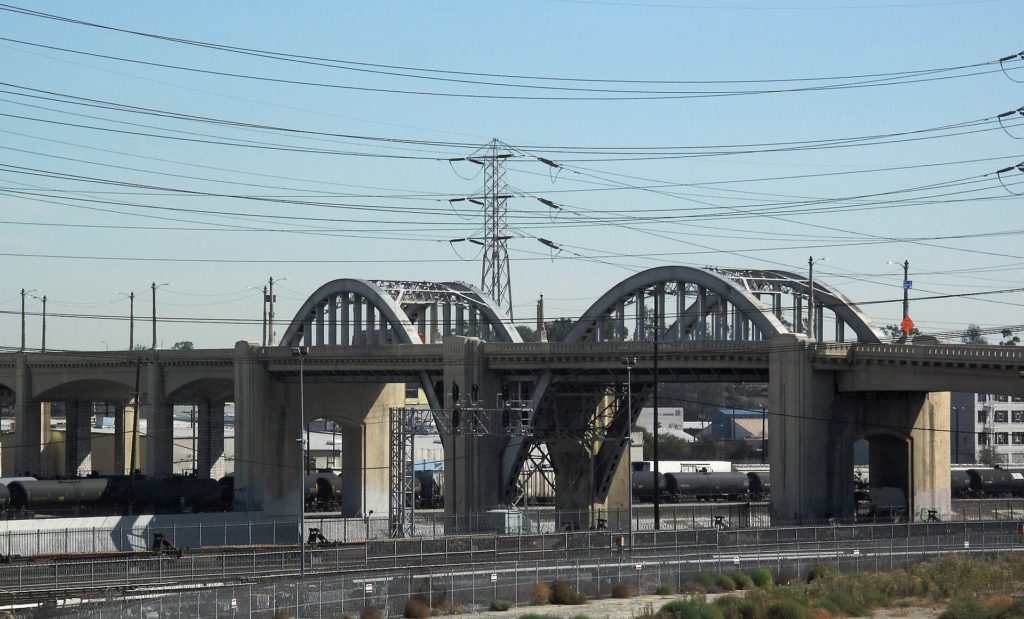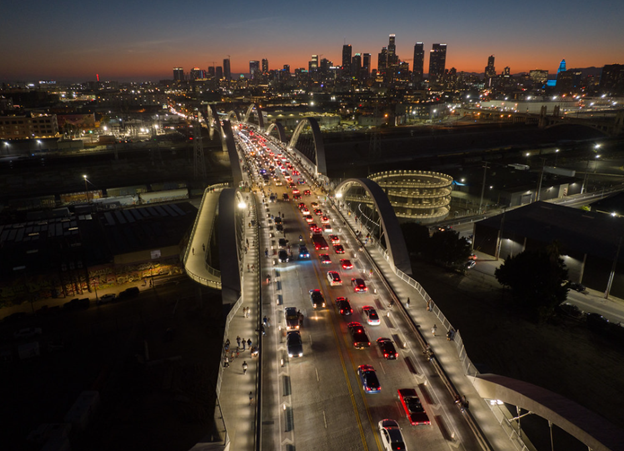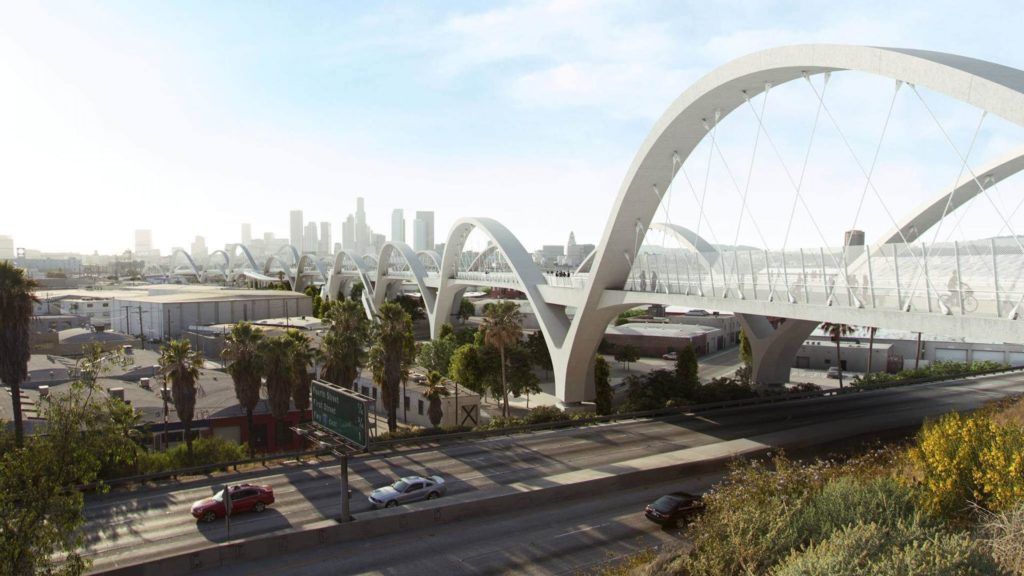Feature image credit: Shutterstock
Good luck finding a local topic hotter than the opening and closing (and re-opening and re-closing) of the Sixth Street Viaduct. That’s a lot of opening and closing and we can reasonably expect more of the same over the next few months. The redesigned Sixth Street Bridge was opened to the public with serious fanfare on the weekend of July 10th. There were fireworks. There was live music. And there was plenty of that walking that Angelenos reportedly hate to do. But the real revelry didn’t follow until the welcoming crowd cleared. Flash forward three weeks and Los Angeles law enforcement have impounded six vehicles, issued 57 citations, and completely closed bridge access several times. Is the Sixth Street Viaduct strong enough to endure its novel status in contemporary Los Angeles?
Why Do People Care So Much About the Sixth Street Viaduct?

If you’re unfamiliar with the Sixth Street Viaduct, you may wonder why people are so excited about a bridge. Many East LA residents consider the original Sixth Street Bridge a cultural icon. This was reinforced by its notable appearance in several movies, music videos, and TV shows over the decades. Films like Repo Man, To Live and Die in L.A., Colors, and Blood In Blood Out highlighted a facet of LA living that lacked the superficial glitz and glamor often attributed to Hollywood. These movies were diverse in theme, yet relatable to an underrepresented class of Los Angeles resident Hollywood’s cameras typically kept out of frame. And the Sixth Street Bridge made prominent appearances in all of them.
Why the Original Sixth Street Bridge Had to Go
With the Sixth Street Viaduct connecting Boyle Heights to downtown LA’s arts district, a diversity of people felt an attachment to the structure. Unfortunately, compromises formed in the structure over the decades. Most of this boiled down to an inadequate concrete formula used in the bridge’s original 1932 construction. At one point, it was estimated that the bridge had a 70% chance of collapse in a major earthquake. So, despite the deep love that locals harbored for the Sixth Street Viaduct, demolition began on February 5, 2016. The destruction of the original Art Deco-inspired bridge was the end of an era for many East LA residents.
New Bridge. New Era.

Architect Michael Maltzan designed the latest incarnation of the Sixth Street Viaduct. Distinguished by 10 sets of luminous arches, it has a monolithic futurist look that wouldn’t be out of place in Bladerunner’s depiction of Los Angeles. Eventually, the bridge will pass over a lush and verdant riverside park as the Los Angeles River restoration project comes to fruition.
Popular reaction to the bridge in the wake of its unveiling has skewed positive. However, critics point out that the design never delivered substantial safeguards for pedestrians and bicyclists. And those substandard safeguards become even more glaring in the wake of erratic incidents that have stained the new bridge with controversy.
Mayhem on the Sixth Street Viaduct
In its first three weeks, the renewed Sixth Street Viaduct has served as the scene for mounting displays of chaos verging on the comic. Almost overnight, graffiti saturated blank slates of concrete. But with the city’s tagging culture, officials were fully expecting the graffiti. In fact, the bridge’s budget has a significant allotment for daily graffiti monitoring and maintenance. It wasn’t even a shock when those services were needed within 24 hours of the bridge opening.
And if graffiti had been where the debauchery stopped, we’d have no need to write this blog. But then the street takeovers started. Traffic screeched to sudden halts as Dodge Challengers spun circles of molten rubber in the center of the bridge, chasing their own exhaust pipes in a desperate search for Tik Tok clout. Already, the lanes are marred by clashing circles of charred rubber.
More than once, a driver overestimated his abilities and sent his car rocketing into the thinly protected pedestrian area. Thankfully, no one was in the path of these erratic autos. However, these accidents illustrated that plastic dividers are woefully ineffective for pedestrian safety.
Pedestrian Pandemonium
Then, pedestrians actually got in on the act with their own brand of thrill seeking. They began to mount the looming archways, easily climbing to the zenith for views colored by death-defying thrill. Skateboarders have attempted to hurtle from the top of an arch to the sidewalk below with minor injury and the “honor” of the bridge’s first death constantly looming.
Then, there are the straight up oddities attracted by the bridge’s chaotic energy. In one incident, a barber offered haircuts in the bridge’s modest median. In another, a tattoo artist took to the designated pedestrian sidewalk to ink a patron.
But this isn’t spontaneous insanity urged on by the return of a beloved civic monument. Social media is the method behind the madness. Spurned on by the promise of their 15 minutes of fame, or simply a bit of free promotion for their businesses, people are drawn to the bridge.
These displays aren’t about the bridge. The Sixth Street Viaduct is simply their amplifier. And that $588 million amplifier keeps getting shut down so that the people who truly love it for what it represents can’t enjoy it. Then again, this is Los Angeles. If you’re not here for the spectacle, you might be in the wrong city.

The Speed Bumps Are Coming…
While daily graffiti removal was always part of the plan, lawmakers didn’t expect the volume of street takeovers, clout chasers, and thrill seekers the Sixth Street Bridge has attracted. Officials were obviously caught off guard by the fervor over the bridge. But considerations are already underway for a slew of reactive measures that will hopefully prevent future bridge closures. These include building a concrete median to deter street takeovers and adding fixtures to the arches that prevent climbing and skating.
On Sunday, July 31st, the city began adding speed bumps to the stretch. Officials are also currently reviewing a temporary median in hopes the mania will die down without a permanent solution. And as for the arches? The city is reviewing costs for adding fencing as a climbing preventative. In the meantime, Los Angeles police are stepping up traffic enforcement efforts on the Sixth Street Viaduct.
The Chaos Continues… But For How Much Longer?
But some Angelenos believe this isn’t enough to quell the fervor. Some have suggested permanently closing the bridge to automobile traffic and leaving it to the pedestrians and bicyclists. Yet, bicyclists were at the heart of the most recent bridge closure on Sunday, July 31st. A group of bicyclists organized to block cars from passing, possibly to protest cars veering into designated pedestrian areas to park. It remains to be seen where the saga of the new Sixth Street Viaduct will end.
With a brand that says as much as JohnHart’s, Senior Copywriter Seth Styles never finds himself at a loss for words. Responsible for maintaining the voice of the company, he spends each day drafting marketing materials, blogs, bios, and agent resources that speak from the company’s collective mind and Hart… errr, heart.
Having spent over a decade in creative roles across a variety of industries, Seth brings with him vast experience in SEO practices, digital marketing, and all manner of professional writing with particular strength in blogging, content creation, and brand building. Gratitude, passion, and sincerity remain core tenets of his unwavering work ethic. The landscape of the industry changes daily, paralleling JohnHart’s efforts to {re}define real estate, but Seth works to maintain the company’s consistent message while offering both agents and clients a new echelon of service.
When not preserving the JohnHart essence in stirring copy, Seth puts his efforts into writing and illustrating an ongoing series entitled The Death of Romance. In addition, he adores spending quality time with his girlfriend and Romeo (his long-haired chihuahua mix), watching ‘70s and ‘80s horror movies, and reading (with a particular penchant for Victorian horror novels and authors Yukio Mishima and Bret Easton Ellis). He also occasionally records music as the vocalist and songwriter for his glam rock band, Peppermint Pumpkin.


